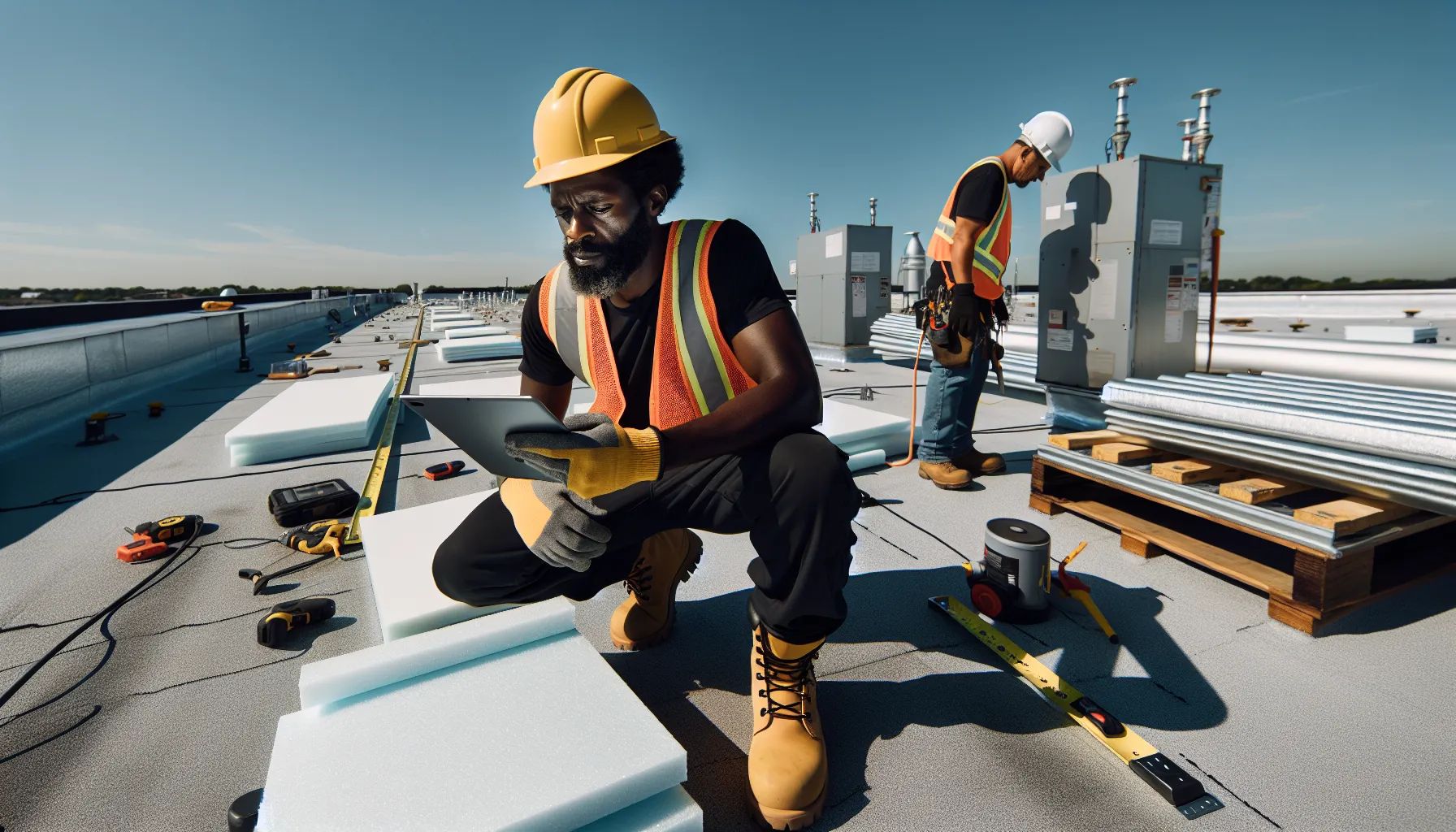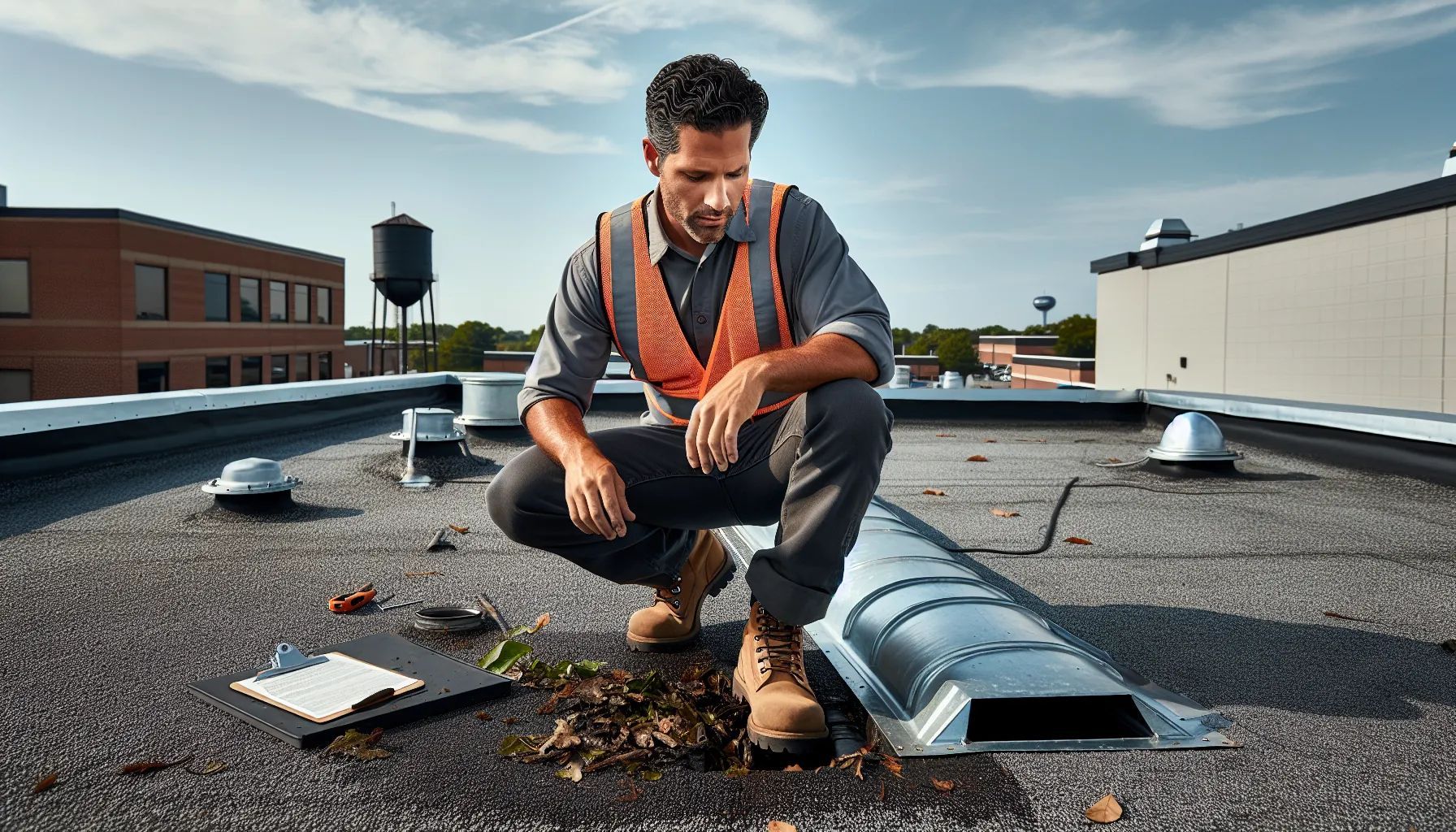What Is a Commercial Roofer? Guide to Professional Roofing Services
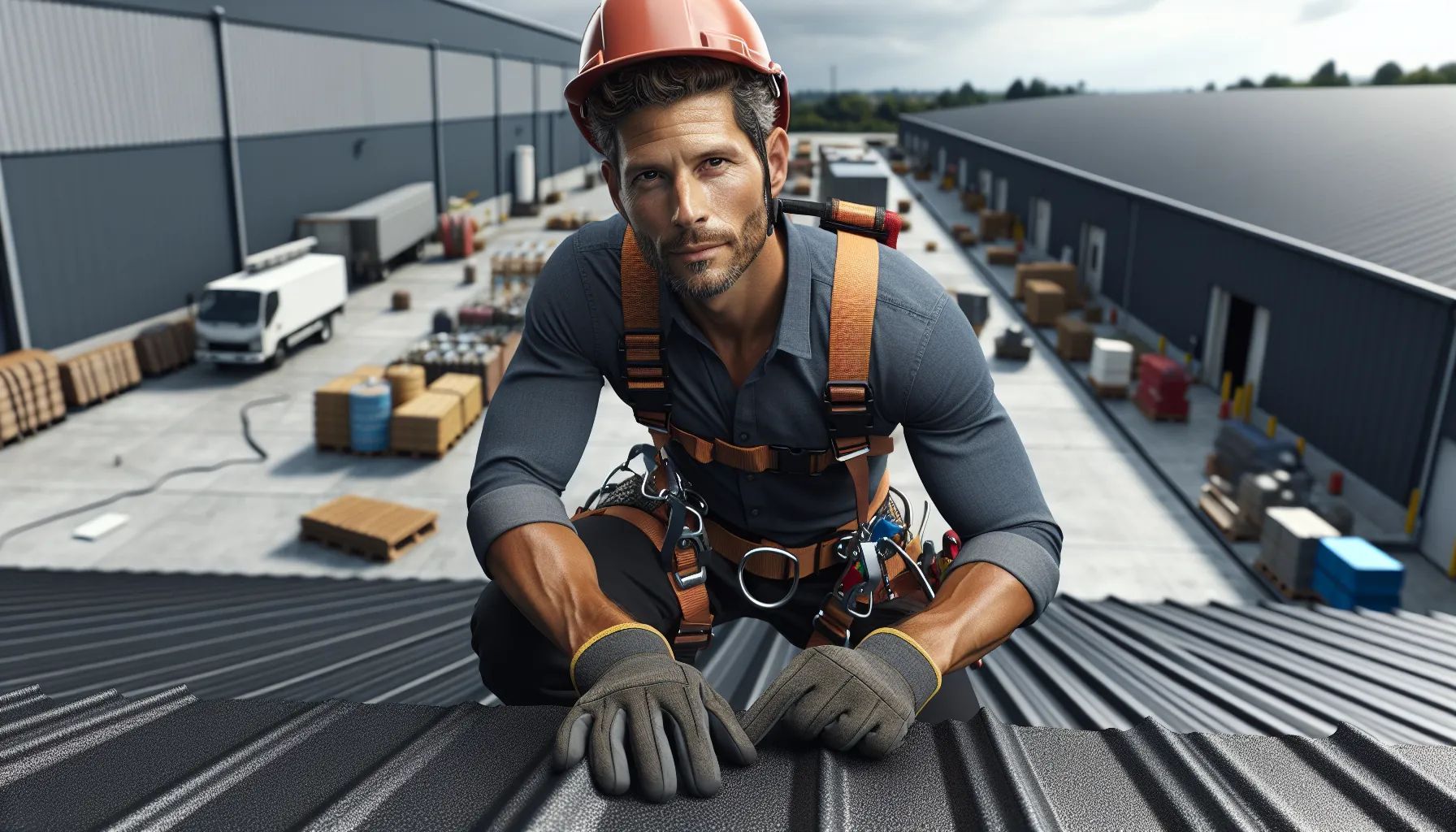
When you're managing a business property you've probably wondered what is a commercial roofer and how they differ from residential contractors. We've all seen crews working on massive warehouses and office buildings but understanding their specialized role can save you thousands in the long run.
Commercial roofers aren't just scaled-up versions of the folks who fix your home's shingles. They're specialized contractors who tackle complex roofing systems that protect everything from retail stores to industrial facilities. Their expertise goes far beyond simple repairs.
We'll explore the unique skills these professionals bring to the table and why choosing the right commercial roofer can make or break your building's integrity. From flat roof systems to specialized materials you won't find on houses there's more to this trade than meets the eye.
What Commercial Roofers Do
Commercial roofers perform specialized roofing services for business properties including offices, warehouses, retail stores, and industrial facilities. We execute complex installations and repairs that require advanced technical knowledge beyond typical residential roofing work.
Core Services and Responsibilities
Commercial roofers install new roofing systems on buildings ranging from 10,000 to 500,000 square feet. We remove existing roof materials and prepare the deck surface for new installation. Our teams apply waterproof membranes using methods like torch application, adhesive bonding, or mechanical fastening.
We conduct detailed roof inspections twice yearly to identify potential issues. Commercial roofers document damage through photographs and written reports. We measure moisture levels using infrared scanners and electronic detection equipment.
Repair work includes patching membrane tears, replacing damaged flashing, and sealing penetrations around HVAC units and vents. We clear drainage systems and install overflow scuppers to prevent water accumulation. Commercial roofers coordinate with building owners to schedule work during off-hours to minimize business disruption.
Emergency response services operate 24/7 for storm damage and sudden leaks. We provide temporary tarping and immediate repairs to protect inventory and equipment. Our crews maintain safety certifications for working at heights exceeding 30 feet.
Types of Commercial Roofing Systems They Work With
Commercial roofers install five primary flat roof systems. TPO (Thermoplastic Polyolefin) membranes cover 40% of commercial buildings due to their energy efficiency and 20-year lifespan. We heat-weld TPO seams creating watertight bonds stronger than the membrane itself.
EPDM (Ethylene Propylene Diene Monomer) rubber roofing suits buildings in extreme temperature zones. Commercial roofers apply EPDM in sheets up to 50 feet wide, reducing seam quantity. We secure EPDM using ballasted systems with river rock or mechanically attached fasteners.
Modified bitumen roofing combines asphalt with polymer modifiers for enhanced durability. We install modified bitumen in two-layer systems using torch application or cold adhesives. Built-up roofing (BUR) uses alternating layers of tar and gravel, creating roofs lasting 30+ years.
Metal roofing systems include standing seam panels and corrugated sheets in aluminum, steel, or copper. Commercial roofers install metal roofs on structures with slopes between 1/4:12 and 3:12 pitch. We add insulation layers achieving R-values up to 30 for energy code compliance.
Differences Between Commercial and Residential Roofers
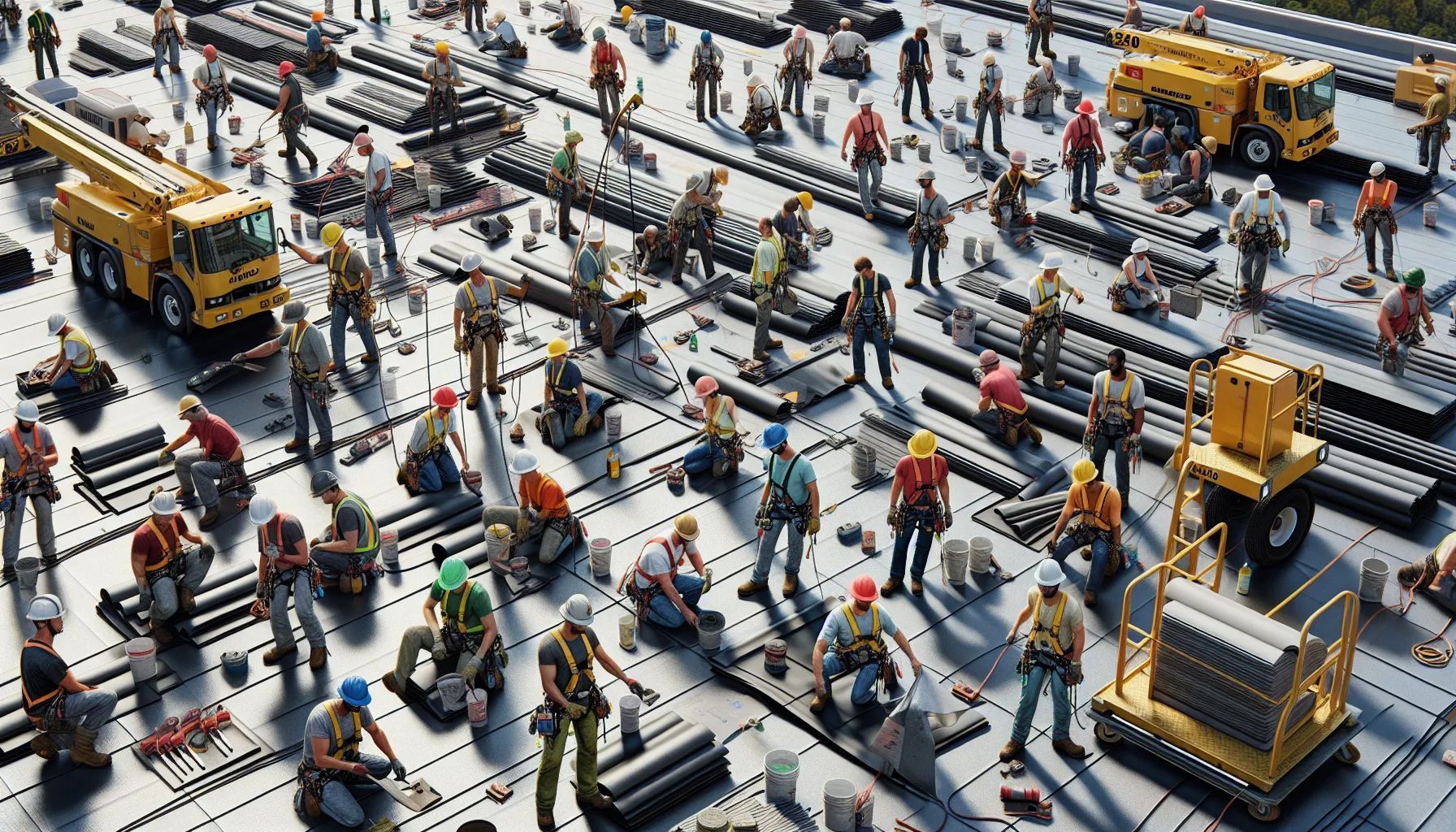
Commercial roofers handle large-scale projects on flat roofs while residential roofers work on smaller pitched systems. The differences extend beyond roof size to include materials, equipment, installation methods, and project timelines.
Scale and Complexity of Projects
Commercial roofing projects cover expansive areas ranging from 10,000 to 500,000 square feet. Office buildings, warehouses, and shopping centers require weeks or months to complete. These projects involve multiple roof layers including insulation boards, vapor barriers, cover boards, and waterproof membranes. Each layer serves a specific function in protecting the building from water infiltration and thermal loss.
Commercial roofers coordinate with building managers, architects, and safety inspectors throughout the project. They install drainage systems, roof hatches, and equipment curbs for HVAC units weighing thousands of pounds. The flat roof design requires precise slope calculations to direct water toward drains and prevent pooling.
Residential projects typically cover 1,500 to 4,000 square feet and complete within 1-3 days. Roofers work on single-family homes with pitched roofs that naturally shed water. The steep angles eliminate the need for complex drainage systems. Installation involves laying underlayment, installing shingles or tiles, and adding flashing around chimneys and vents.
Specialized Equipment and Materials
Commercial roofers use industrial-grade equipment including motorized hoists, hot-air welders, and modified bitumen torches. Safety harnesses, guardrails, and warning line systems protect workers on expansive flat surfaces. Crews operate propane-powered roofing kettles that heat asphalt to 450°F for built-up roofing applications.
Material selection differs significantly between commercial and residential applications. Commercial projects use:
- TPO membranes (45-80 mil thickness)
- EPDM rubber (45-90 mil thickness)
- PVC membranes (50-80 mil thickness)
- Modified bitumen sheets
- Sprayed polyurethane foam
These materials withstand foot traffic, equipment vibration, and chemical exposure from rooftop machinery. Installation requires specialized training in heat welding, adhesive application, and seam testing procedures.
Residential roofers work with lighter materials designed for pitched surfaces. Asphalt shingles, clay tiles, wood shakes, and metal panels attach with nails or screws. Standard hand tools like hammers, nail guns, and tin snips complete most installations. Ladder systems and roof jacks provide adequate safety for steep-slope work.
When to Hire a Commercial Roofer
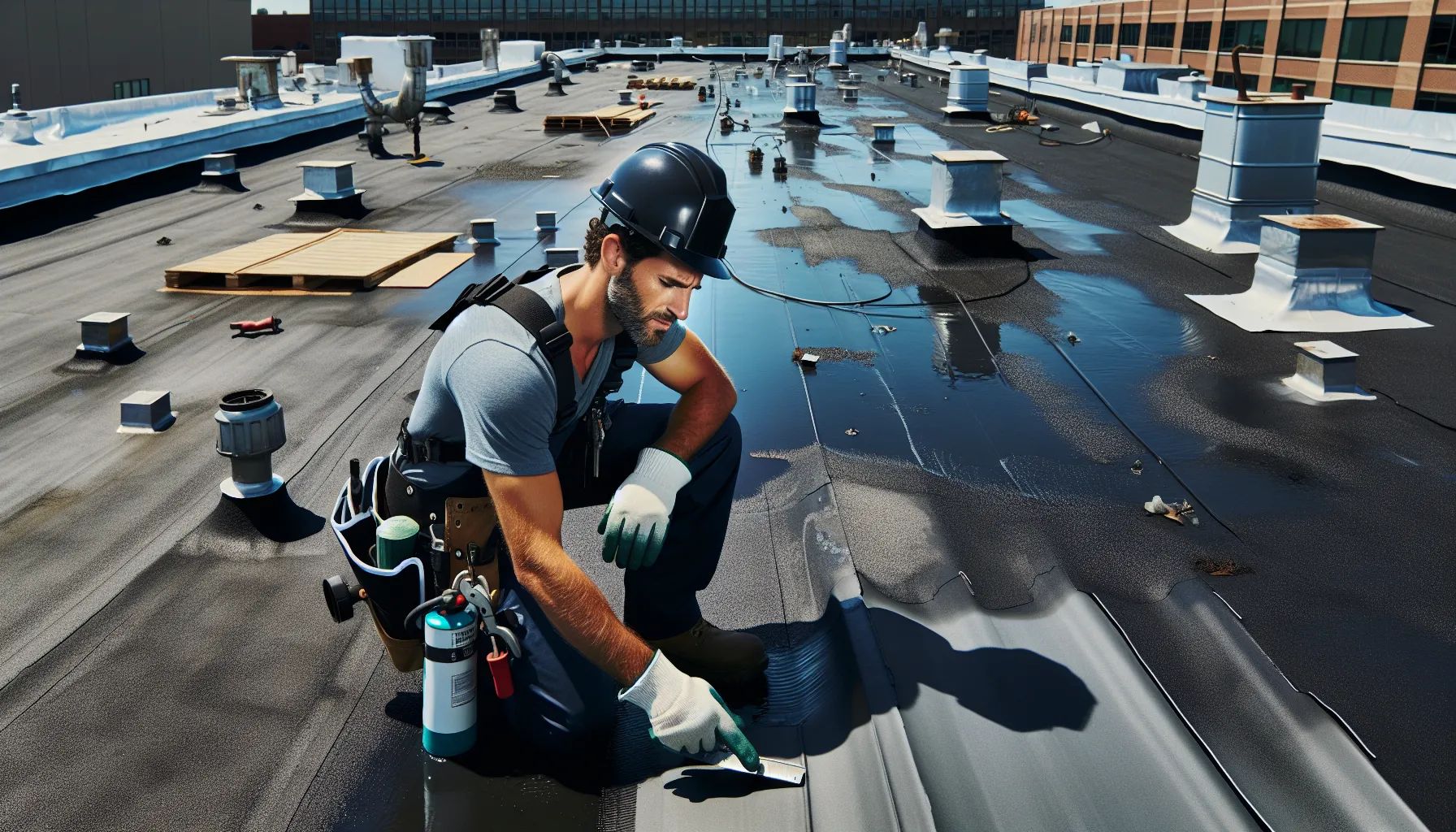
Commercial roofing systems demand specialized attention at critical moments throughout their service life. We recognize four primary scenarios that require professional commercial roofing expertise to protect your investment and maintain operational continuity.
Common Commercial Roofing Issues
Water infiltration represents 65% of commercial roofing problems. Pooling water develops when drainage systems fail or roof membranes deteriorate. Commercial properties experience this issue most frequently on flat roofs where proper slope calculations weren't maintained during installation.
Weather damage accounts for another 25% of roofing failures. Hail strikes create punctures in TPO and EPDM membranes. Wind speeds exceeding 60 mph lift improperly secured roof edges. Snow accumulation beyond 30 pounds per square foot stresses structural components.
Age-related deterioration affects all commercial roofing materials. EPDM membranes lose elasticity after 15-20 years. Modified bitumen develops cracks and splits. Metal roofing panels experience fastener backing-out and seam separation.
Insulation failures compromise energy efficiency and indoor climate control. Vapor barriers break down, allowing moisture penetration. R-value decreases by 40% when insulation becomes saturated. Annual energy costs increase by $0.50-$1.00 per square foot in affected buildings.
Signs Your Business Needs Professional Roofing Services
Interior water stains indicate immediate roofing concerns. Brown or yellow discoloration on ceiling tiles signals active leaks. Paint bubbling on walls suggests moisture penetration through the roof assembly. These symptoms require professional assessment within 48 hours to prevent structural damage.
Exterior damage presents clear warning signs. Membrane blistering exceeds 2 inches in diameter. Flashing separates from parapet walls. Roof drains show visible rust or deterioration. Professional roofers identify these issues during biannual inspections.
Energy cost spikes reveal hidden roofing problems. Monthly utility bills increase by 15-30% when roof insulation fails. HVAC systems run continuously to maintain temperature settings. Temperature variations exceed 5 degrees between different building zones.
Physical debris accumulation accelerates roof deterioration. Leaves and branches clog drainage systems. Standing water promotes algae growth. Bird droppings create acidic conditions that degrade roofing materials. Commercial roofers remove debris and restore proper drainage during maintenance visits.
How to Choose the Right Commercial Roofing Contractor
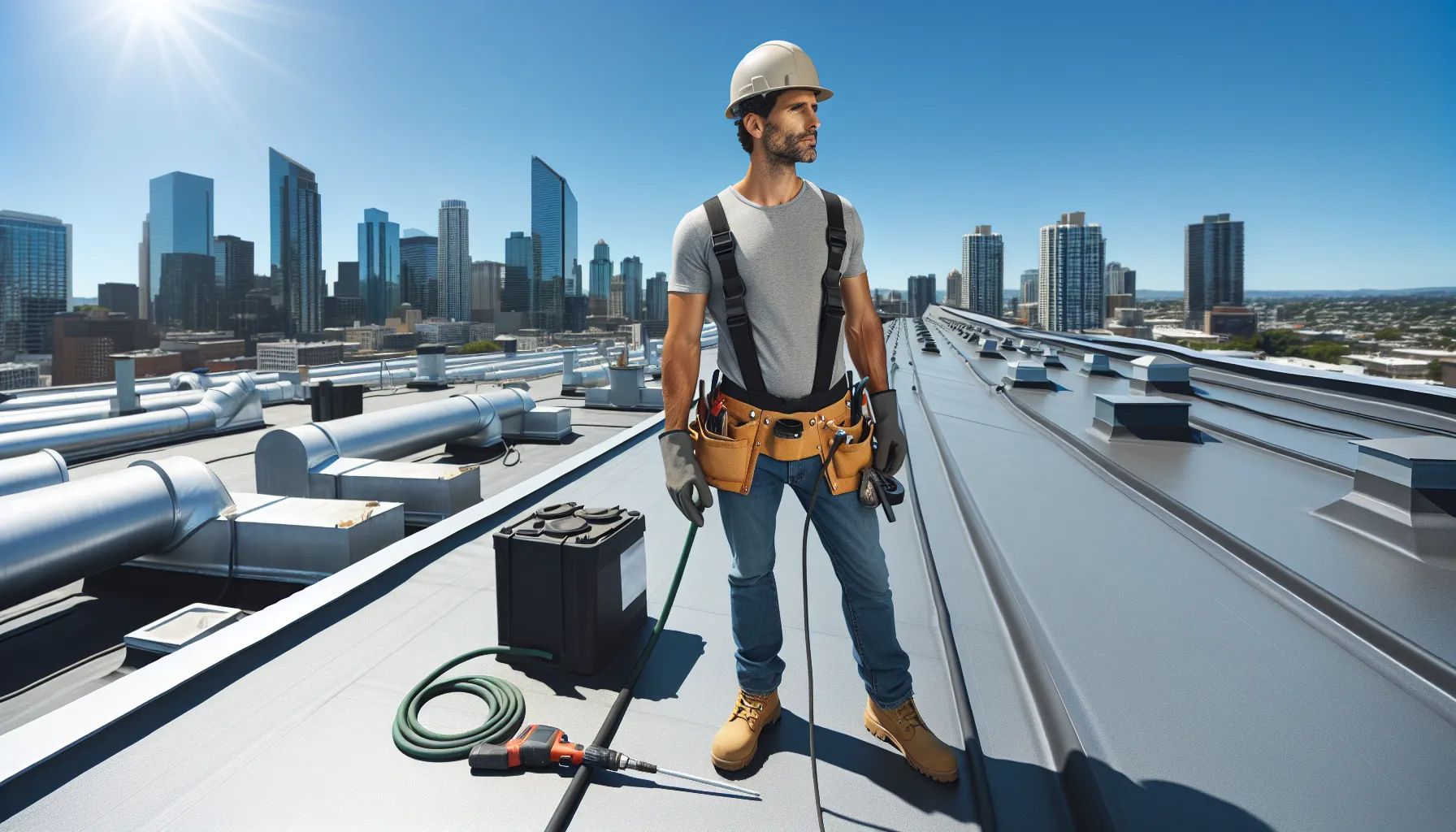
Selecting a qualified commercial roofing contractor protects your investment and ensures proper installation. We recommend evaluating contractors based on specific criteria that demonstrate their expertise and reliability.
Essential Qualifications and Certifications
Commercial roofers require state licensing in 36 states across the US. Verify your contractor holds active licensing through your state's contractor board website. Insurance coverage represents another critical qualification. Contractors carry three types: general liability ($1-2 million minimum), workers' compensation, and commercial auto insurance.
Manufacturer certifications distinguish experienced contractors from competitors. GAF Master Select contractors complete 40 hours of training annually and maintain $1 million in liability coverage. These certifications enable contractors to offer 20-year NDL warranties compared to standard 10-year coverage.
OSHA compliance demonstrates commitment to safety. Commercial roofers complete OSHA 30-hour training for construction safety. This training covers fall protection, ladder safety, and hazard communication specific to roofing work.
Professional associations provide additional validation. National Roofing Contractors Association (NRCA) members follow industry best practices and ethical standards. Membership requires annual dues of $1,200 and adherence to professional codes.
Questions to Ask Before Hiring
Ask these eight questions during contractor interviews:
Insurance and Legal Status
- Do you carry general liability insurance with $1 million minimum coverage?
- Can you provide current certificates for workers' compensation insurance?
Experience and Expertise
- How many years have you installed [specific roof type] systems?
- What percentage of your projects involve commercial properties over 20,000 square feet?
Project Management
- Who supervises the crew during installation?
- How do you handle weather delays or unexpected repairs?
Warranties and Guarantees
- What manufacturer warranties can you offer?
- Do you provide workmanship warranties beyond manufacturer coverage?
Request written responses to these questions. Professional contractors provide detailed answers with supporting documentation. Contractors who avoid specific answers or refuse documentation requests lack proper qualifications.
Compare responses from three contractors minimum. Price variations of 15-20% between quotes indicate normal market competition. Variations exceeding 30% suggest scope differences or qualification gaps requiring further investigation.
Conclusion
Understanding what commercial roofers do and when to hire them protects your building investment and ensures business continuity. We've explored how these specialized professionals bring technical expertise that goes far beyond simple repairs.
Making the right choice in a commercial roofing contractor sets the foundation for years of reliable protection. Their advanced knowledge of flat roofing systems and industrial-grade materials keeps your property safe from the elements while maintaining energy efficiency.
Whether you're facing emergency repairs or planning preventive maintenance, partnering with qualified commercial roofers gives you peace of mind. They'll handle the complexities of large-scale projects while you focus on running your business.
Take action before small issues become costly problems. Regular inspections and timely interventions by certified professionals extend your roof's lifespan and protect your bottom line. Your building deserves the expertise that only experienced commercial roofers can provide.
What is the difference between commercial and residential roofers?
Commercial roofers specialize in large-scale flat roof systems for businesses, warehouses, and office buildings, handling projects from 10,000 to 500,000 square feet. They work with industrial-grade materials like TPO and EPDM membranes. Residential roofers focus on smaller pitched roofs using shingles and lighter materials. Commercial projects require advanced technical knowledge, specialized equipment, and can take weeks or months to complete.
What services do commercial roofers provide?
Commercial roofers install new roofing systems, remove existing materials, and apply waterproof membranes. They conduct biannual inspections, document damage, and repair various roofing components. Emergency response services for storm damage and leaks are available 24/7. Additional services include insulation installation, drainage system maintenance, and preventive maintenance programs to extend roof lifespan.
What are the main types of commercial roofing systems?
The five primary commercial roofing systems are TPO (thermoplastic polyolefin), EPDM (rubber roofing), modified bitumen, built-up roofing (BUR), and metal roofing. Each system offers different benefits: TPO provides energy efficiency, EPDM offers durability, modified bitumen ensures flexibility, BUR provides multiple protective layers, and metal roofing delivers longevity with minimal maintenance.
When should I hire a commercial roofer?
Hire a commercial roofer when you notice water infiltration, storm damage, or age-related deterioration. Warning signs include interior water stains, membrane blistering, rising energy costs, and debris accumulation. Most commercial roofs need professional attention every 15-20 years, or immediately after severe weather events. Regular inspections help identify issues before they become costly repairs.
How do I choose the right commercial roofing contractor?
Verify the contractor's state licensing, insurance coverage, and manufacturer certifications. Check their compliance with OSHA safety standards and request references from similar projects. Ask about their experience with your specific roof type, project timeline, warranty offerings, and emergency response capabilities. Compare quotes from multiple contractors to ensure competitive pricing and comprehensive service coverage.
What safety certifications should commercial roofers have?
Commercial roofers must have OSHA safety certification for working at heights, fall protection training, and hazardous material handling credentials. They should carry general liability insurance and workers' compensation coverage. Many reputable contractors also hold manufacturer certifications for specific roofing systems, ensuring proper installation techniques and warranty compliance.
